2015-2016学年牛津沪教版七年级英语下册期末作文大全
- 格式:doc
- 大小:31.00 KB
- 文档页数:6
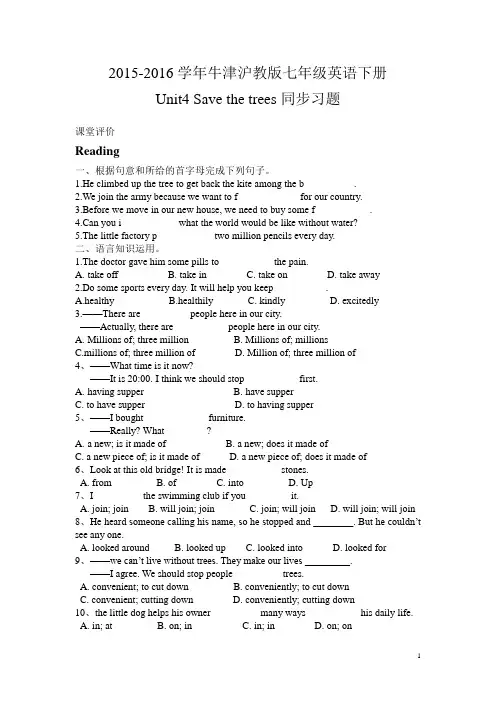
2015-2016学年牛津沪教版七年级英语下册Unit4 Save the trees同步习题课堂评价Reading一、根据句意和所给的首字母完成下列句子。
1.He climbed up the tree to get back the kite among the b__________.2.We join the army because we want to f____________ for our country.3.Before we move in our new house, we need to buy some f___________.4.Can you i___________ what the world would be like without water?5.The little factory p___________ two million pencils every day.二、语言知识运用。
1.The doctor gave him some pills to __________ the pain.A.take offB. take inC. take onD. take away2.Do some sports every day. It will help you keep __________.A.healthyB.healthilyC. kindlyD. excitedly3.——There are _________ people here in our city.——Actually, there are __________ people here in our city.lions of; three millionB. Millions of; millionslions of; three million ofD. Million of; three million of4、——What time is it now?——It is 20:00. I think we should stop __________ first.A.having supperB. have supperC. to have supperD. to having supper5、——I bought ____________ furniture.——Really? What ________?A.a new; is it made ofB. a new; does it made ofC. a new piece of; is it made ofD. a new piece of; does it made of6、Look at this old bridge! It is made __________ stones.A. fromB. ofC. intoD. Up7、I _________ the swimming club if you ________ it.A. join; joinB. will join; joinC. join; will joinD. will join; will join8、He hea rd someone calling his name, so he stopped and ________. But he couldn’t see any one.A. looked aroundB. looked upC. looked intoD. looked for9、——we can’t live without trees. They make our lives _________.——I agree. We should stop people _________ trees.A. convenient; to cut downB. conveniently; to cut downC. convenient; cutting downD. conveniently; cutting down10、the little dog helps his owner _________ many ways __________ his daily life.A. in; atB. on; inC. in; inD. on; on三、根据中文提示完成下列句子。
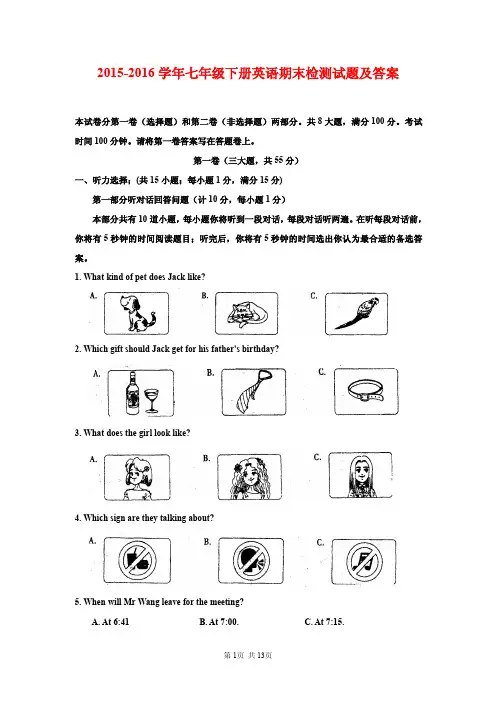
2015-2016学年七年级下册英语期末检测试题及答案本试卷分第一卷(选择题)和第二卷(非选择题)两部分。
共8大题,满分100分。
考试时间100分钟。
请将第一卷答案写在答题卷上。
第一卷(三大题,共55分)一、听力选择;(共15小题;每小题1分,满分15分)第一部分听对话回答问题(计10分,每小题1分)本部分共有10道小题,每小题你将听到一段对话,每段对话听两遍。
在听每段对话前,你将有5秒钟的时间阅读题目;听完后,你将有5秒钟的时间选出你认为最合适的备选答案。
1.What kind of pet does Jack like?2.Which gift should Jack get for his father's birthday?3.What does the girl look like?4.Which sign are they talking about?5.When will Mr Wang leave for the meeting?A.At6:41B.At7:00.C.At7:15.6.Where is Mr.Baker now?A.In his office.B.In a hospital.C.In a restaurant.7.How did the man like the film?A.Great.B.Terrible.C.Boring.8.Why does the girl like blue?A.Because it makes her feel excited.B.Because it is the same color as her eyes.C.Because it is the same color as the sea.9.How did the girl go to school today?A.On footB.By bikeC.In her father's car10.How much did the woman pay for her piano?A.¥4,056B.¥4,560C.¥40,056第二部分听对话和短文回答问题(计5分,每小题1分)你将听到一段对话和一篇短文,各听两遍。
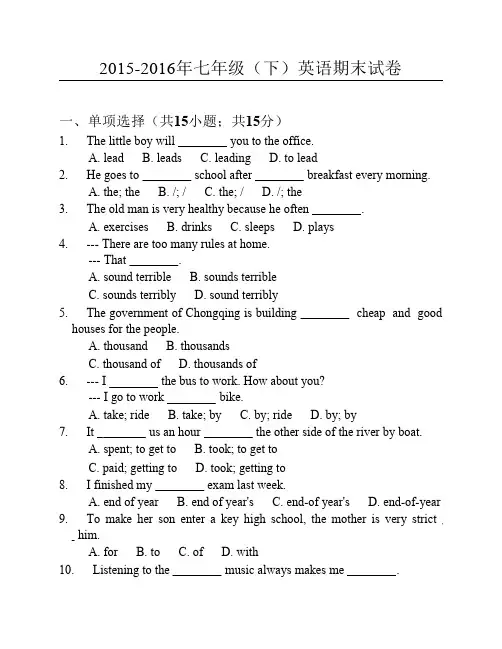
2015-2016年七年级(下)英语期末试卷一、单项选择(共15小题;共15分)1. The little boy will you to the office.A. leadB. leadsC. leadingD. to lead2. He goes to school after breakfast every morning.A. the; theB. /; /C. the; /D. /; the3. The old man is very healthy because he often .A. exercisesB. drinksC. sleepsD. plays4. --- There are too many rules at home.--- That .A. sound terribleB. sounds terribleC. sounds terriblyD. sound terribly5. The government of Chongqing is building cheap and good houses for the people.A. thousandB. thousandsC. thousand ofD. thousands of6. --- I the bus to work. How about you?--- I go to work bike.A. take; rideB. take; byC. by; rideD. by; by7. It us an hour the other side of the river by boat.A. spent; to get toB. took; to get toC. paid; getting toD. took; getting to8. I finished my exam last week.A. end of yearB. end of year'sC. end-of year'sD. end-of-year9. To make her son enter a key high school, the mother is very strict him.A. forB. toC. ofD. with10. Listening to the music always makes me .A. relaxed; relaxingB. relaxed; relaxedC. relaxing; relaxingD. relaxing; relaxed11. There are many animals in the zoo. But some animal are scary.A. kinds of; kind ofB. kinds of; kinds ofC. kind of; kind ofD. kind of; kinds of12. The are playing games with their on the playground.A. child; woman teachersB. children; women teacherC. children; women teachersD. childs; womans teachers13. Mr. White teaches maths very well.A. weB. ourC. usD. ours14. there water in the cup?A. IsB. AreC. HasD. Have15. --- Bill, can I get you anything to drink?--- .A. You are welcomeB. No problemC. I wouldn't mind a coffeeD. Doesn't matter二、完形填空(共10小题;共15分)Do you often eat in a restaurant? If you like eating without 16 ,there is a restaurant just for you. You can eat in it in New York.A man went to a restaurant in India. He ate without saying any 17 there. The man 18 this very much. He thought it was great. He came back and 19 a restaurant.It is a 20 restaurant. People can't talk there. They can 21 eat and drink there. Some people like it. They eat slowly and they enjoy the 22 better. They can truly pay attention to (注意) 23 they're eating.So it is a bit 24 other restaurants. In other restaurants people usually talk. Some people don't 25 the owner. They like talking when they are eating.16. A. laughing B. talking C. seeing D. listening17. A. words B. questions C. problems D. answers18. A. minded B. welcomed C. liked D. thanked19. A. bought B. visited C. sold D. opened20. A. cheap B. terrible C. strange D. special21. A. only B. often C. still D. never22. A. waiter B. food C. price D. table23. A. what B. when C. where D. how24. A. different from B. similar toC. friendly toD. good for25. A. think of B. look for C. go with D. agree with三、阅读理解(共15小题;共30分)Asubject.Math C You like this subject.But you are not good atthis subject because youare a little lazy. It isdisappointing. You can dobetter if you try your best.Music B It is a happy thing tohear you play the piano.You are crazy aboutmusic. Although you likethis subject best, youraccent has a bad influenceon your singing.26. James got the best grade in .A. EnglishB. PhysicsC. MathD. Music27. The underlined word "effort" means " " in Chinese.A. 分值B. 计划C. 努力D. 兴趣28. Why did not James get the best grade in music?A. He was a little lazy.B. He had a strong accent.C. He didn't play the piano well.D. He didn't like music.29. Which of the following is TRUE according to this passage?A. James studies hard in physics.B. James doesn't like math.C. James' speaking is good.D. James is good at singing.30. From this passage, we know that .A. James is a bad studentB. all the teachers are happy with JamesC. James had the exams on January 24thD. studying hard can make one get good gradesBThis is a picture of the twins' house. It's near the river. Near the house you can see Lucy and Lily. They are under the tree with some other children-two boys and two girls. Look! There is Mrs. King. She's the twins' mother. She is near the door of the house.“Come here, children! It's tea-time!” she says.There are three trees near the twins' house. There is one big tree and two small trees.In the big tree there is a bird. Can the bird sing? Yes, it can.What's that near the tree? It's a cat.“I want some food.” thinks the cat. “Bird, come here!” says the cat.“Not today. Thank you!” says the bird. “You can't catch me! Goodbye!”31. Where is the twins' house? .A. Near the riverB. In the treeC. In the picture32. How many children are there in the picture?A. 4B. 6C. 733. Is Mrs. King near the door of the house?A. Yes, he isB. Yes, she isC. No, she isn't34. “It's tea-time!” means .A. It's time for teaB. It's time to playC. It's time to go to bed35. Can the cat catch the bird? .A. Yes, it canB. No, it can'tC. I don't knowCLi Qiang and Li Gang are twins. But their life habits(习惯) are quite different. Now let's go to Li Qiang's room. Li Qiang tidies up his bedroom every day and puts everything in the right place. Look! There is a computeron the desk. There are two balls under the bed. A guitar and a kite are on the wall. All the things are placed in order. So he must be a careful boy. Now let's go to Li Gang's house. The room is in a mess. His clothes are on the bed. Some books and newspapers are on the floor. What's that on the desk? Oh, a fork and a knife. All of the things are out of order. Li Gang never does some cleaning on weekends. No wonder his room is in such a mess.How do you think of Li Qiang and Li Gang?36. What's the relationship(关系) between Li Qiang and Li Gang?A. BrothersB. SistersC. FriendsD. Father and son37. Where is the guitar?A. On the floorB. On the wallC. In Li Gang's houseD. On the desk38. The room is in a mess. What does it mean in Chinese?A. 干净, 整洁B. 在衣橱间C. 在一块儿D. 乱七八糟39. What do you think of Li Gang?A. CarefulB. CarelessC. TallD. Short40. Where should a fork and knife be put?A. BedroomB. Living roomC. KitchenD. Bathroom四、补全对话(选择)(共5小题;共10分)A: Hello! May I speak to Tom, please?B: Speaking. 41.A: This is Bill. I called you yesterday, but you were not at home.B: 42. I need to prepare something for my trip to Shanghai.A: Shanghai? That's where the World Exposition (世博会) was held. How lucky you are!B: So I am. 43.A: I'll have a birthday party next Friday. Would you like to come?B: 44. My plane will take off next Wednesday.A: What a pity (遗憾) that you can't come! 45.B: Thank you very much. Bye!A: Bye!A. Who's that?B. I'd like to, but I'm afraid I can't.C. I'm buying something for my aunt.D. Have a good trip!E. I was shopping at that time.F. Who are you?G. What did you call me for?五、按要求转换句型(共5小题;共10分)46. Get up early, or you will be late. (改为同义句)get up early, you be late.47. The film had begun when I got there. (对划线部分提问)the film ?48. We'd better eat ice cream every day. (改为否定句)We ice cream every day.49. I decided to be a professional athlete when I was five. (改为同义句)I to be a professional athlete at the five.50. The case is so heavy that I can't move it out of the room alone. (改为同义句)The case is heavy for me move out of the room alone.六、单词拼写(单句首字母填空)(共5小题;共5分)51. Forty and fifty is n .52. We should obey the traffic r .53. --- How do you like your school l ?--- It's very nice and I like reading books there.54. Mrs. Green doesn't have enough money to buy e clothes.55. I like music very much. I want to be a m when I grow up.七、适当形式填空(单句适当形式)(共5小题;共5分)56. I enjoy (skate) on the ice in winter.57. Many children like to eat (candy).58. He (take) a map with him when he went out yesterday.59. Look! Mike (use) a computer.60. It takes me ten minutes (get) to my home by bus.八、翻译(根据中文提示完成句子)(共5小题;共5分)61. --- Can I use your bike?--- Sure. But you must return it (准时).62. 司科特喜欢在晚上写故事。
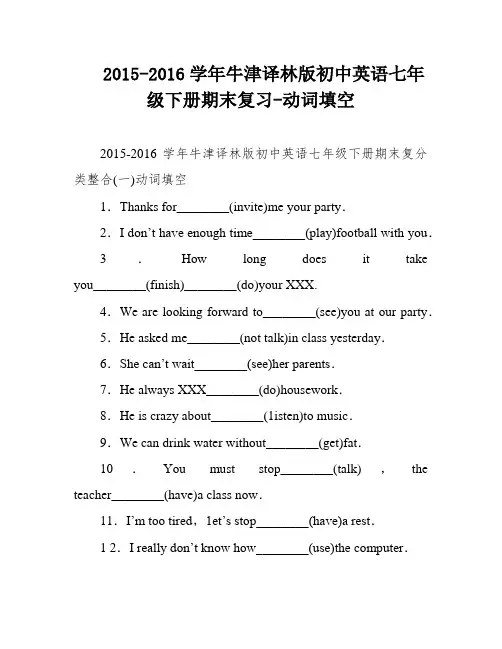
2015-2016学年牛津译林版初中英语七年级下册期末复习-动词填空2015-2016学年牛津译林版初中英语七年级下册期末复分类整合(一)动词填空1.Thanks for________(invite)me your party.2.I don’t have enough time________(play)football with you.3.How long does it take you________(finish)________(do)your XXX.4.We are looking forward to________(see)you at our party.5.He asked me________(not talk)in class yesterday.6.She can’t wait________(see)her parents.7.He always XXX________(do)housework.8.He is crazy about________(1isten)to music.9.We can drink water without________(get)fat.10.You must stop________(talk),the teacher________(have)a class now.11.I’m too tired,1et’s stop________(have)a rest.1 2.I really don’t know how________(use)the computer.13.We would like everybody________(bring)their own food.14.I hope you________(have)a good XXX party.15.The T-shirt made me________(1ook) coo1.16.At the weekend.I usually go________(run)for half an hour.17.It’s very important for everyone________(have)lots of water every day.18.My mother often asks me________(help)her with the housework.19.There are lots of fun and interesting things________(see)in the museum.20.There are many children________(swim)in the river.21.What about________(visit)our local theatre with us?22.The girl still hopes________(see)her XXX.23.His mother makes him________(clean)his own bedroom every day.24.They don’t have________(go)far if they need help.25.XXX________(get)ready for XXX.26.XXX’t have much time________(go)shopping.27.Why don’t you________(bring)your homework here.28.why not________(go)shopping with us at the weekend?29.He often practices________(read)English in the morning.30.We classmates should________(help)and learn from each other.31.I spend about 2 hours________(chat)with my friends on the Internet every week.XXX________(read).33.I am happy________(see)to many people there.34.He was surprised________(see)his old friend on the way home.35.________(be)late for school again,you should get up early.36.It’s easy________(walk)from XXX Park.37.We found it very useful________(1earn)English well.38.We use ladders________(climb)the trees.39.I________(be)so excited when I________(hear)the news last night.40.________your cousin________(watch)TV every night?41.There________(be)a class XXX.42.Where________your parents________(have)1unch tomorrow?43.Yesterday I___(search)the Internet for a long time and_____(find)somethinginteresting.44.Where________she________(have)lunch just now? She________(have)it XXX1.45.It________(take)him an hour________(read)this book yesterday.46.Be quiet! The teachers________(have)an XXX________(buy)me a nice present for my birthday last week.48.His grandfather________(die)four years ago.49.Where________your parents________(have)1unch tomorrow?50.They________(have)the Science Museum next Sunday.51.Marv with her mother often________(go)to the market on Sundays.52.-________there________(be)XXX evening?一No,XXX book________(belong)to you?-Yes,it’s mine.54.It’s 9:00 a.m.,we________(have)a class.55.He(not want)to go XXX.56.-________you________(watch)TV last night?-No,I______.I______(do)XXX________(have)another match in two days.58.What time________we________(1eave)tomorrow ?59.Who________(teach)you English last year?60.一Where is XXX?一He________(plan)a XXX street and you________(find)the post office.62.My brother________(study)Japanese five yeas ago.63.They________(have)a meeting next week,aren’t they?64.Tim,________(not play)with the cat now.It’s time for XXX________(be)ill last week,so I had________(look)after her at home.66.John________(not help)me with my lessons last night.67.How soon________your father________(come)back from Shanghai?68.________(not play)the XXX.69.We________(can not)XXX.70.There________(be)a XXX fridge.71.Do you want________(buy)a computer?72.Can you________(keep)secrets?73.XXX________(help)others.。
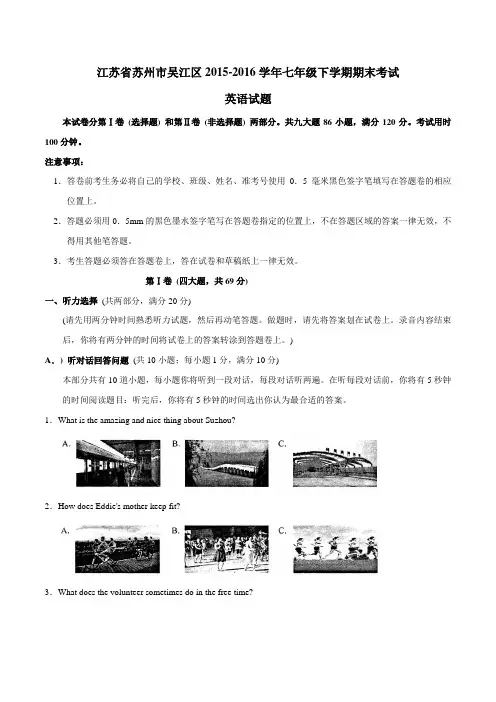
江苏省苏州市吴江区2015-2016学年七年级下学期期末考试英语试题本试卷分第Ⅰ卷(选择题) 和第Ⅱ卷(非选择题) 两部分。
共九大题86小题,满分120分。
考试用时100分钟。
注意事项:1.答卷前考生务必将自己的学校、班级、姓名、准考号使用0.5毫米黑色签字笔填写在答题卷的相应位置上。
2.答题必须用0.5mm的黑色墨水签字笔写在答题卷指定的位置上,不在答题区域的答案一律无效,不得用其他笔答题。
3.考生答题必须答在答题卷上,答在试卷和草稿纸上一律无效。
第Ⅰ卷(四大题,共69分)一、听力选择(共两部分,满分20分)(请先用两分钟时间熟悉听力试题,然后再动笔答题。
做题时,请先将答案划在试卷上。
录音内容结束后,你将有两分钟的时间将试卷上的答案转涂到答题卷上。
)A.) 听对话回答问题(共10小题;每小题1分,满分10分)本部分共有10道小题,每小题你将听到一段对话,每段对话听两遍。
在听每段对话前,你将有5秒钟的时间阅读题目:听完后,你将有5秒钟的时间选出你认为最合适的答案。
1.What is the amazing and nice thing about Suzhou?2.How does Eddie's mother keep fit?3.What does the volunteer sometimes do in the free time?4.Which is Kitty′s favourite pet?5.When does the shop open on weekdays?A.At 8:00 a.m.B.At 8:30 a.m.C.At 9:00a.m.6.What's the date today?A.May 31st.B.June 1st.C.July 1st.7.Where is the man going?A.To the cinema.B.To the library.C.To the museum.8.Which floor does Hobo live on?A.On the sixteenth floor.B.On the eighteenth floor.C.On the twentieth floor.9.Whose birthday is it?A.The man's.B.The woman's.C.Both A and B.10.Why didn't the boy go to watch the basketball game yesterday evening?A.Because he didn't like it.B.Because he felt sick.C.Because he had a lot of homework to do.B) 听对话和短文回答问题(共10小题;每小题1分,满分10分)你将听到一段对话和两篇短文,各听两遍。
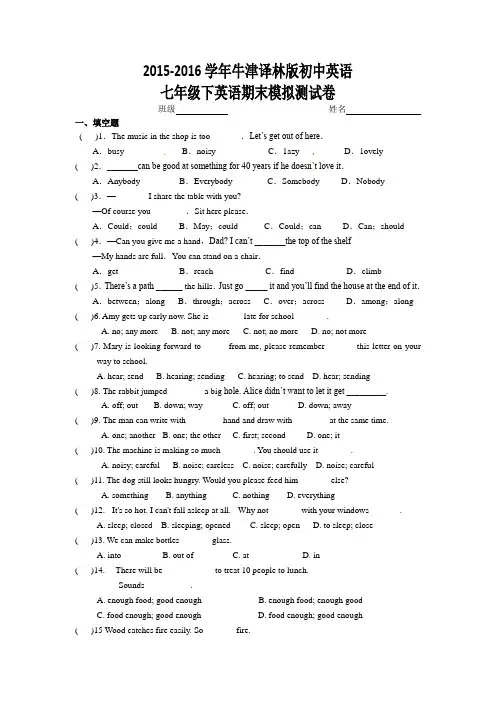
2015-2016学年牛津译林版初中英语七年级下英语期末模拟测试卷班级姓名一、填空题( )1.The music in the shop is too_______.Let‟s get out of here.A.busy B.noisy C.1azy D.1ovely( )2._______can be good at something for 40 years if he doesn‟t love it.A.Anybody B.Everybody C.Somebody D.Nobody( )3.— _______I share the table with you?—Of course you .Sit here please.A.Could;could B.May;could C.Could;can D.Can;should ( )4.—Can you give me a hand,Dad? I can‟t _______the top of the shelf—My hands are full.You can stand on a chair.A.get B.reach C.find D.climb( )5.There‟s a path ______ the hills.Just go _____ it and you‟ll find the house at the end of it.A.between;along B.through;across C.over;across D.among;along ( )6. Amy gets up early now. She is _______ late for school _______.A. no; any moreB. not; any moreC. not; no moreD. no; not more( )7. Mary is looking forward to _____ from me, please remember ______ this letter on your way to school.A. hear; sendB. hearing; sendingC. hearing; to sendD. hear; sending( )8. The rabbit jumped ________a big hole. Alice didn‟t want to let it get _________.A. off; outB. down; wayC. off; outD. down; away( )9. The man can write with________ hand and draw with ________at the same time.A. one; anotherB. one; the otherC. first; secondD. one; it( )10. The machine is making so much _______. You should use it _______.A. noisy; carefulB. noise; carelessC. noise; carefullyD. noise; careful( )11. The dog still looks hungry. Would you please feed him_______ else?A. somethingB. anythingC. nothingD. everything( )12. - It's so hot. I can't fall asleep at all. - Why not_______ with your windows_______.A. sleep; closedB. sleeping; openedC. sleep; openD. to sleep; close( )13. We can make bottles_______ glass.A. intoB. out ofC. atD. in( )14. ---There will be ___________ to treat 10 people to lunch.---Sounds __________.A. enough food; good enoughB. enough food; enough goodC. food enough; good enoughD. food enough; good enough( )15 Wood catches fire easily. So_______ fire.A. keep it away fromB. don't keep it away fromC. keep it awayD. don't keep it away ( )16.—Look! The man is________ the poster at the bus stop.—Let‟s go and stop him.We should keep our city clean.A.putting out B.putting up C.1ooking at D.1ooking for ( )17.________fathers are both doctors,aren‟t they?A.Amy‟s and Sally B.Amy and Sally‟s C.Amy and Sally D.Amy‟s and Sally‟s ( )18.The________ of September this year is the ________Teacher‟s Day.A.tenth;thirtieth B.ten;thirty C.tenth;thirty D.ten;thirtieth ( )19.You look ti red.________ stop ________ and have a rest?A.Why not;to work B.Why don‟t you;to workC.Why not;working D.Why not you;working( )20.—Can you go cycling with me?— ________.I‟ll go to the Helping Hands Club.A.Sounds great B.1‟m afraid not C.I‟m not sure D.I don‟t think so二、完形填空Once there was an island (岛屿) in the sea. All the feelings lived on the island: Happiness, Sadness, Love, and all of the others.One day, all the feelings knew that the island would sink (沉没), so they prepared to 1 . But Love decided to stay. When the island was 2 sinking, Love asked for help.First, Love asked Richness, “Can you 3 me with you?” Richness answered. “No. There is a lot of 4 in my boat. There is no place for you.” Love asked Vanity (虚荣), “Please help me!” “I can‟t help you, Love. You are all wet and might make my boat 5 .” Vanity answered. Then Love asked Sadness, “Sadness, let me go with you.” “Oh, I am so sad that I need to be 6 !” Later, Happiness passed by, but she was too ha ppy to 7 Love‟s voice!Suddenly, there was a voice, “Love, I will take you.” It was an elder. Love felt so excited that she 8 to ask his name.When they arrived at a 9 place, the elder went away. Love asked Knowledge, “Who helped m e?” “It was Time,” Knowledge answered. “But 10 did Time help me?” Knowledge smiled and answered, “Because only Time can understand how great Love is.”( )1. A. stay B. swim C. leave D. die( )2. A. almost B. hardly C. already D. just( )3. A. help B. take C. send D. drop( )4. A. wood B. rice C. grass D. gold( )5. A. dirty B. nice C. heavy D. light( )6. A. happy B. alive C. alone D. afraid( )7. A. hear B. see C. notice D. watch( )8. A. remembered B. forgot C. decided D. stopped( )9 A. beautiful B. secret C. dangerous D. safe( )10. A. when B. where C. why D. how三、阅读理解AHere is our pet dog,Mr. Hawkeye. Mr. Hawkeye is seven years old,and we got him from our vet (兽医). He takes in a lot of cats. He receives his name because he is such a hawk (掠夺者) around food. If you are not looking,he will take a sandwich off your plate. He can smell the delicious food in the fridge from another floor in the house,and potato chips are his favourite thing to steal! This comes the name,Hawkeye. Hawkeye was a great animal at the vet. They thought he could bring good luck and he took care of all the new cats,giving them baths,etc. He does that at our house as well. Like I said,he is quite a character and very friendly. He always greets(问候) us when we come home. He has to check out all the bags to make sure if there‟s food there for him, especially chips!( )1. Mr. Hawkeye is _______.A. our pet dogB. the owner of the petC. a catD. a vet( )2. He receives his name Hawkeye because _______.A. he is a hawk around foodB. he can bring good luckC. he is a real characterD. he is quick at eating food( )3. Our pet likes _______.best of all.A. sandwichesB. potato chipsC. potatoesD. new catsBQuestion: Why does my cat lick (舔) me?My cat is one year old. She is very shy. She often plays alone. But these days, she often jumps onto my knees and licks my hand, even wh en I‟m working. It makes me feel a little worried. Is there anything wrong with her? Does she just like the salt on my hand? Is it just a sign of love? Or all of the above?Susan SmithAnswer:Yes. Your cat licks you because of “all of the above”. Bu t most often, it is a sign of love. Another way of showing love is biting on your nose or your face gently. Also, looking at you and blinking (眨) her eyes is a way of saying “I love you.” When she blinks her eyes, you can respond (回应) in the same way. I do that with my cats all the time.So there is nothing to worry about. Just enjoy her licking you!YoursDr White( )4. Susan Smith‟s cat is _______.months old.A. sixB. twelveC. eighteenD. twenty-four( )5. Susan‟s cat licks Su san on her _______.A. kneesB. feetC. armsD. face( )6. Susan feels _______. her cat when she licks her.A. afraid ofB. happy aboutC. sad atD. worried about ( )7. Dr White thinks licking is often a sign of “_______.”.A. loveB. hungryC. bored (无聊的)D. tiredCCan we make animals work for us? Some scientists think that one day we can teach animals to do a lot of things for people. They say that in a film or on TV, you may see elephants, monkeys, dogs or some other animals do a lot of things. If you watch carefully, you may find those animals are always given a little food to eat after they do something. Scientists say that people can teach many different animals to do some easy work if they know they will get something to eat.We all know elephants are strong and can carry large logs(木头). Dogs can look after houses. And we can even teach animals to work in factories. In America, for example, people use apes(猿) to help make cars, and scientists think that those large monkeys may, one day, drive trains. Now people are trying to get them to do something just like men.( )8. People can teach animals to do some easy work if _______.A. they have enough food to eatB. they know they'll get something to eatC. they are as clever as menD. they are sent to the animal school( )9. Elephants can do some heavy work because theyA. eat a lotB. are very strongC. are quite heavyD. have large ears( )10. You know we can use dogs to _______.A drive trains B. help make carsC. keep houses safeD. carry logs( )11. Scientists are trying to make big monkeys _______.A. work in factoriesB. build housesC. drive trainsD. drive carsD“We‟re in our new house. Let‟s get a new pet to get along with us,” Mrs Brown said to her husband.“That sounds like a pretty good idea,” he answered. “Do you want to see the ads in the newspaper?”“Let‟s go to the animal shelter. Many pets there need homes. Since tomorrow is Saturday, we can both go,” she said.Next morning the Browns met Mr. Snow at the animal shelter. “We want to be sure that the pets here go to good homes,” Mr. Snow said, “So I need to ask you some questions.”After they talked for a while, the Browns decided to get a small dog. It wouldn…t need a big house or a big yard. A small dog would bark(吠)and warn them if someone tried to break into their house. After Mr. Snow gave the Browns a book on pet care,they chose one and wanted totake her home right away. But the animal doctor hadn‟t checked her yet. So Mr. Snow told them to return on Sunday.On Sunday afternoon the Browns went to the animal shelter. The animal doctor said,“Shadow has had all of her shots(预防针). She will be healthy.” The browns thanked the doctor and took Shadow home.( )12. From the reading we learn that __________.A. the Browns have never had a pet before.B. the Browns knew about Shadow from the newspaper.C. Shadow is a small and healthy dog.D. Mr Brown didn…t quite agree with his wife.( )13. The word shelter in the reading means ___________.A. a place to sell small dogsB. a place to keep homeless animalsC. a place to study animalsD. a place to sell books on pet care( )14. Mr Snow asked the Browns some questions to ___________.A. see if they had moved to a new house?B. find out how rich the Browns wereC. know where they‟d keep their new petD. make sure they‟d take care of pets( )15. The Browns thinks that a small dog ___________.A. doesn…t need any room to keepB. can help them watch their houseC. eats less food than a bigger one?D. usually has a beautiful name第Ⅱ卷(非选择题)四、词汇运用A)单词拼写根据下列句子的语境、首字母及所给中文,写出空缺处各单词的正确形式。

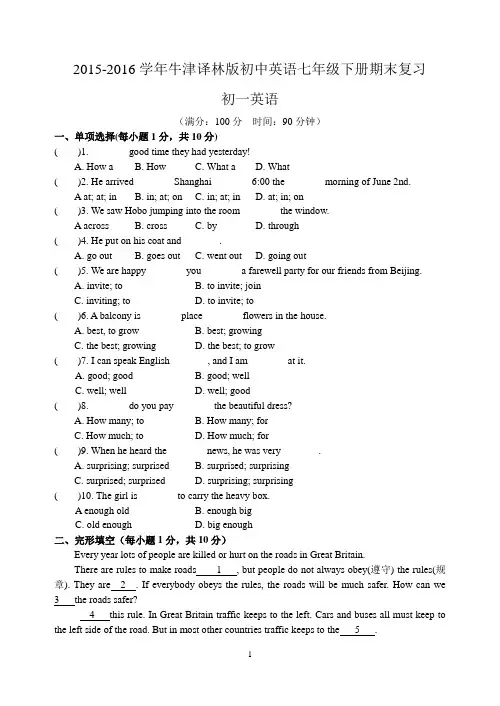
2015-2016学年牛津译林版初中英语七年级下册期末复习初一英语(满分:100分时间:90分钟)一、单项选择(每小题1分,共10分)( )1. _______ good time they had yesterday!A. How aB. HowC. What aD. What( )2. He arrived _______ Shanghai _______ 6:00 the _______ morning of June 2nd.A at; at; in B. in; at; on C. in; at; in D. at; in; on( )3. We saw Hobo jumping into the room _______ the window.A across B. cross C. by D. through( )4. He put on his coat and _______.A. go outB. goes outC. went outD. going out( )5. We are happy _______ you _______ a farewell party for our friends from Beijing.A. invite; toB. to invite; joinC. inviting; toD. to invite; to( )6. A balcony is _______ place _______ flowers in the house.A. best, to growB. best; growingC. the best; growingD. the best; to grow( )7. I can speak English _______, and I am _______ at it.A. good; goodB. good; wellC. well; wellD. well; good( )8. _______ do you pay _______ the beautiful dress?A. How many; toB. How many; forC. How much; toD. How much; for( )9. When he heard the _______ news, he was very _______.A. surprising; surprisedB. surprised; surprisingC. surprised; surprisedD. surprising; surprising( )10. The girl is _______ to carry the heavy box.A enough old B. enough bigC. old enoughD. big enough二、完形填空(每小题1分,共10分)Every year lots of people are killed or hurt on the roads in Great Britain.There are rules to make roads 1 , but people do not always obey(遵守) the rules(规章). They are 2 . If everybody obeys the rules, the roads will be much safer. How can we3 the roads safer?4 this rule. In Great Britain traffic keeps to the left. Cars and buses all must keep to the left side of the road. But in most other countries traffic keeps to the5 .Before crossing the road, 6 and look both ways. Then, if you are sure the road is 7 , it is safe to cross the road. If you see small children or very 8 people, you should help them cross the road. We must teach young children to cross the road 9 . We must always give 10 a good example.( )1. A wide B. small C. big D. safe( )2. A careful B. careless C. helpful D. unhelpful( )3. A make B. let C. have D. get( )4. A Forget B. Remember C. Miss D. Catch( )5. A left B. north C. right D. south( )6. A stop B. go C. run D. walk( )7. A clean B. dirty C. busy D. clear( )8. A young B. old C. strong D. tall( )9. A. quickly B. happily C. suddenly D. safely( )10. A. him B. us C. them D. it三、阅读理解(每小题2分,共30分)AI'll show you the wayPat Hogan was travelling around the country in his car. One evening he was driving along a road and was looking for a small hotel, when he saw an old man at the side of the road. He stopped his car and said to the old man, "I want to go to the Sun Hotel. Do you know it?""Yes," the old man said, "I'll show you the way. "He got into Pat's car, and they drove for about twelve miles. When they came to a small house, the old man said, "Stop here."Pat stopped and looked at the house. "But this isn't a hotel," he said to the old man."No," the old man answered, "this is my house. And now I'll show you the way to the Sun Hotel. Turn round and go back nine miles. Then you'll see the Sun Hotel on the left. "( )1. Where was Pat looking for?A. The Sun Hotel.B. The Star Hotel.C. The Moon Hotel.D. The old man's house.( )2. Whom did Pat meet?A. A policeman.B. An old man.C. An old woman.D. A young man( )3. Where did the old man take Pat to?A. The Sun Hotel.B. A supermarket.C. The old man's house.D. The police station( )4. How far did Pat drive after the old man got on his car?A. Five miles.B. Twelve miles.C. Three miles.D. Nine miles.( )5. How far was the hotel from the place Pat saw the old man?A Twenty-one miles. B. Twelve miles.C. Nine miles.D. Three miles.BDuring the day we work and play, and at night we sleep. Our bodies rest while we sleep. In the morning we are ready to work and play again. While we are asleep, our bodies grow most. Children usually need more sleep. We can get our lessons better and feel better when we have plenty of rest. Boys and girls need ten hours of sleep every night when they are eight or nine years old. Our bodies need lots of air when we sleep. If we do not get enough fresh(新鲜的) air, we'll feel tired when we wake up. While we are in bed, we must not cover our heads. If we do that, our lungs(肺)will not get enough fresh air. If we open our windows at night we can have plenty of fresh air. Cool air is better than warm air. Boys and girls must get enough sleep if they want to grow and be strong.( )6. Our bodies grow most while we are_______.A eating B. playing C. sleeping D. waking( )7. Which is the best air for us?A Hot air. B. Cool air. C. Warm air. D. Dry air.( )8. Too little sleep makes us_______.A happy B. hungry C. tired D. grow( )9. How much sleep should boys and girls of eight or nine years oldhave every night?A. Eight hours.B. Nine hours.C. Ten hours.D. Seven hours.( )10. What do the lungs need most?A. Fresh air.B. Food.C. Rest.D. Exercise.CHi, dear boys and girls! Do you know how to be a healthy kid? Here are some rules you should follow.First, eat different foods, especially fruit and vegetables. You may have a favourite food, but you'd better eat something different. If you eat different foods, you will probably get more nutrients(营养物质) your body needs.Second, drink water and milk as often as possible. When you're really thirsty, cold water is the No. 1 choice(选择). Milk is a great drink that can give you more calcium(钙) your body needs to grow strong bones(骨头).Third, listen to your body. How do you feel when you are full? When you are eating, notice how your body feels and when your stomach(胃) feels comfortably full. Eating too much will not make you feel comfortable but make you fat.Fourth, limit(限制) screen time. Screen time is the time you watch TV, DVDs and videos, or use computers. It is good to take more exercise such as playing basketball, riding bikes and swimming. You can't watch TV for more than two hours a day.Fifth, be active. One thing you'd like to do as a kid is to find out whichactivity you like best. Find ways to be active every day.Follow these rules and you can be a healthy kid.( )11. You should eat different foods especially _______.A meat B. hamburgersC. sweetsD. fruit and vegetables( )12. Which kind of drinks can give you more calcium?A Juice. B. Milk. C. Cold water. D. Tea.( )13. According to the passage, you should follow _______ rules if you want to be healthy.A five B. nine C. fifteen D. thirteen( )14. According to the passage, which of the following is TRUE?A. When you're eating, you don't have to notice how your body feels.B. You can eat your favourite food as much as possible.C. You can watch TV whenever you like to get more informationD. We should try to live in an active way in our life.( )15. Which is the best title for the passage?A. How to make yourself importantB. How to be a healthy kidC. How to be a popular kidD. How to make your parents healthy四、词汇(每小题1分,共15分)A.根据首字母或中文提示填写单词。
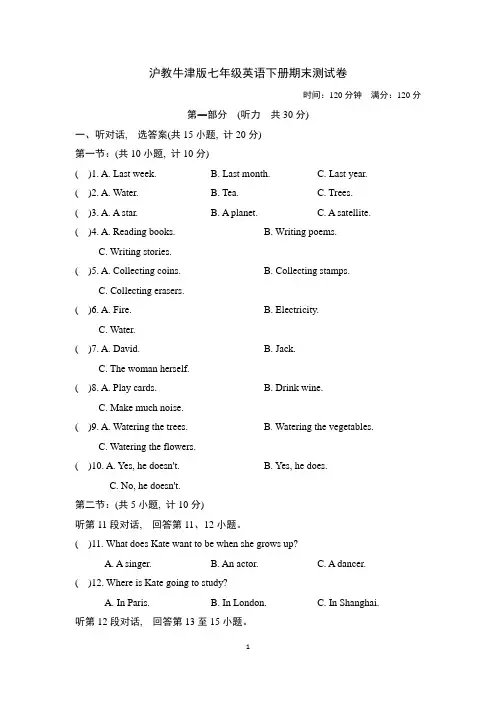
沪教牛津版七年级英语下册期末测试卷时间:120分钟满分:120分第一部分(听力共30分)一、听对话, 选答案(共15小题, 计20分)第一节:(共10小题, 计10分)()1. A. Last week. B. Last month. C. Last year.()2. A. Water. B. Tea. C. Trees.()3. A. A star. B. A planet. C. A satellite.()4. A. Reading books. B. Writing poems.C. Writing stories.()5. A. Collecting coins. B. Collecting stamps.C. Collecting erasers.()6. A. Fire. B. Electricity.C. Water.()7. A. David. B. Jack.C. The woman herself.()8. A. Play cards. B. Drink wine.C. Make much noise.()9. A. Watering the trees. B. Watering the vegetables.C. Watering the flowers.()10. A. Yes, he doesn't. B. Yes, he does.C. No, he doesn't.第二节:(共5小题, 计10分)听第11段对话, 回答第11、12小题。
()11. What does Kate want to be when she grows up?A. A singer.B. An actor.C. A dancer.()12. Where is Kate going to study?A. In Paris.B. In London.C. In Shanghai.听第12段对话, 回答第13至15小题。
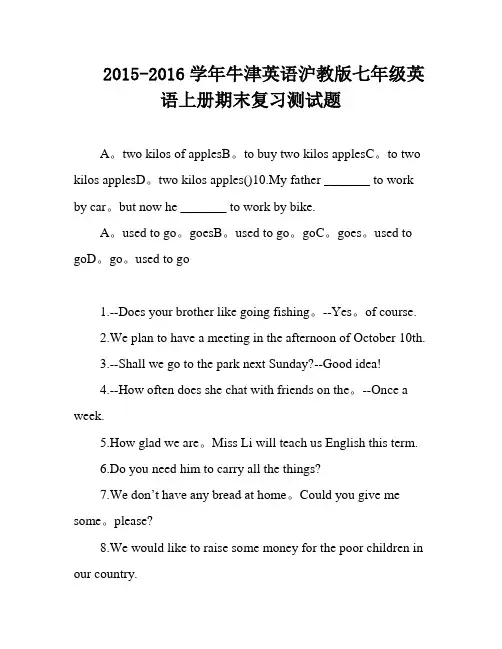
2015-2016学年牛津英语沪教版七年级英语上册期末复习测试题A。
two kilos of applesB。
to buy two kilos applesC。
to two kilos applesD。
two kilos apples()10.My father _______ to work by car。
but now he _______ to work by bike.A。
used to go。
goesB。
used to go。
goC。
goes。
used to goD。
go。
used to go1.--Does your brother like going fishing。
--Yes。
of course.2.We plan to have a meeting in the afternoon of October 10th.3.--Shall we go to the park next Sunday?--Good idea!4.--How often does she chat with friends on the。
--Once a week.5.How glad we are。
Miss Li will teach us English this term.6.Do you need him to carry all the things?7.We don’t have any bread at home。
Could you give me some。
please?8.We would like to raise some money for the poor children in our country.9.-- What can I do for you。
Madam?--I’d like two kilos of apples.10.My father used to go to work by car。
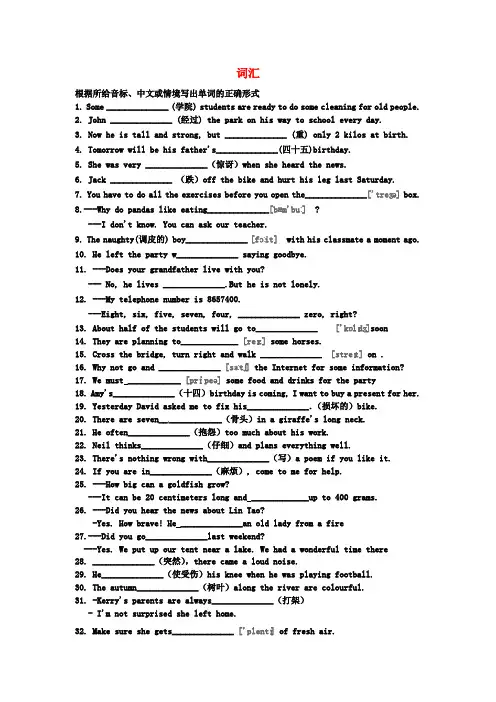
词汇根据所给音标、中文或情境写出单词的正确形式1. Some ______________ (学院) students are ready to do some cleaning for old people.2. John ______________ (经过) the park on his way to school every day.3. Now he is tall and strong, but ______________ (重) only 2 kilos at birth.4. Tomorrow will be his father's______________(四十五)birthday.5. She was very ______________(惊讶)when she heard the news.6. Jack ______________ (跌)off the bike and hurt his leg last Saturday.7. You have to do all the exercises before you open the______________['treʒə]box.8.---Why do pandas like eating______________[bæm'buː]?---I don't know. You can ask our teacher.9. The naughty(调皮的) boy______________ [fɔːit]with his classmate a moment ago.10. He left the party w______________ saying goodbye.11. ---Does your grandfather live with you?--- No, he lives ______________.But he is not lonely.12. ---My telephone number is 8657400.---Eight, six, five, seven, four, ______________ zero, right?13. About half of the students will go to______________ ['kɒlɪdʒ]soon14. They are planning to_____________ [reɪz] some horses.15. Cross the bridge, turn right and walk ______________[streɪt] on .16. Why not go and ______________ [sɜːtʃ] the Internet for some information?17. We must ____________ [prɪ'peə] some food and drinks for the party18. Amy's______________(十四)birthday is coming, I want to buy a present for her.19. Yesterday David asked me to fix his______________.(损坏的)bike.20. There are seven______________(骨头)in a giraffe's long neck.21. He often______________(抱怨)too much about his work.22. Neil thinks______________(仔细)and plans everything well.23. There's nothing wrong with______________(写)a poem if you like it.24. If you are in______________(麻烦), come to me for help.25. ---How big can a goldfish grow?---It can be 20 centimeters long and _____________up to 400 grams.26. ---Did you hear the news about Lin Tao?-Yes. How brave! He ______________an old lady from a fire27.---Did you go______________last weekend?---Yes. We put up our tent near a lake. We had a wonderful time there28. ______________(突然),there came a loud noise.29. He______________(使受伤)his knee when he was playing football.30. The autumn______________(树叶)along the river are colourful.31. -Kerry's parents are always______________(打架)- I'm not surprised she left home.32. Make sure she gets______________ ['plentɪ] of fresh air.33. I think it's t oo expensive. Do you ______________ [ə'griː].34. Do kids have enough______________ ['aʊtdɔː] activities today?35. - Why are you so late today, Simon?-I______________the bus and had to wait for the next one.36. - What is Suzhou______________for?- Its beautiful gardens and soft silk.37. - How did you travel to Tianjin?-______________train.38. You should listen______________ (仔细地). It's very important.39.Ants can smell things very well.How______________ (令人吃惊的)!40 ______________(长颈鹿have seven bones in their necks.41.It is so______________(吵闹的)that I can't think.42. We know that different people have different______________(能力)43. Dad______________(点头)his head when he was listening to my grandfather.44. Ben______________(隐藏)in the bushes, so it took us a long time to find him.45. Look out! The dog______________(跟着)you again!46. Pandas like to eat______________(竹子)47. They went to the mountain to find the______________(宝藏).48. ______________ (蚂蚁) are very small in size.49. The ______________ (地球) looks like a round ball.50. He got home early as ______________ (平常) yesterday.51. ______________ (有人) is at the door. Go to see who it is.52. There are so many people at the corner. What is ______________ (发生)?53. I think ______________ (兔子) are lovely animals.54. The boy had a fall and now there are two ______________ (洞) in his trousers.55. My cousin is too young to go to school ______________ (without any other people).56. The firemen were ______________ (not afraid). They put out the fire in the end.57. Poor Tom, he______________ (hurt someone or something with fire) his left arm.58. ______________(相信)it or not, I did the work on my own.59. The book is full of interesting______________(事实)about plant life60. ______________(妇女)Day is coming. What present are you going to buy for y our mum?61. The little girl spent over three hours______________(准备)for her friend's party.62. John and his family live in a ______________['kwaɪət]street.63. The superman has ______________ [ə'bɪlətiz] to hear things far away and seethings through walls.64. Tom_____________ ['wʌndəd] why the little cat was sleeping on his bed.65. - When is the Tree Planting Day?- It's on the______________of March.66. - There is much______________in that house. Is it on fire?- Maybe. Let's go there to help.67. My cousin likes drawing very much. He wants to be an ______________in the future.68. Can you put a______________ [dʒə'rɑ:f] into a refrigerator? Its neck is so long.69. He found the door______________ [lɔkt] and had to wait outside.70. When will the______________ [ˈtwentiəθ] FIFA World Cup be held in Brazil?71. The man was caught because he set cars on fire and______________(烧毁)a building.72. The music can keep the children______________安静)and happy.73. Jake gave us two______________(刀)and asked us to cut the apples in half.74. About two______________(千)of the visitors were middle school students.75. - Do you know how big the Shanghai Disneyland will be?- It will have an______________of l.5 square kilometers.76. - Why were you late for the meeting?-I ______________the early bus and had to wait for anoth er ten mintures. 77. - It was surprising that the little boy swam______________the river in half an hour.-I can't believe it. He is so young.78. The white ______________ (老鼠)in the cage look quite lovely.79. The bicycles here are the______________(邮递员).80. This young nurse can look after these______________(患病的)people very well.81. Mum often makes Dad______________(拎)all the bags while shopping82. The shoes are a bit______________(大)for my son. He is still a child now.83. Grandpa Li nods his head______________ (高兴)every time I do something for him.84. When the girl woke up, she found______________(自己)under a big tree.85. - Why does your uncle look so sad?- He______________in the driving test again.86. - Don't throw the______________everywhere. Don't you see the bin?- Sorry, I will pick it up.87. - Does your grandfather live with you?- No, he lives______________.But he doesn't feel lonely.88.---Did you go______________ast weekend?---Yes. We put up our tent near a lake. We had a wonderful time there89. -Which country is this photo from, Lily?-It's from _______.This is Eiffel Tower.90. -How large is Zhangjiagang Shopping Park?-It is 15, 000 square meters in_______.91. -I know Rodger lives on the fourth floor. What about Tom?-He lives on the second floor, two floors _______Rodger.92. -Does your sister_______ a bedroom with you?-No, she has a bedroom of her own.93. The_______(参观者)homes are in Sunshine Town.94. -Cindy_______(喂)part of her lunch to her dog.-She must be hungry now.95. The baby is sleeping in the room. Please speak_______ (安静)inside.96. Jim_______(能)see that something was terribly wrong at that time.97. Martin is a_______(15岁)boy and he is from Canada.98. I saw her_______(教)some children to sing a song when I passed by yesterday. 用所给动词的适当形式填空1. My uncle______________(leave) for Shanghai yesterday.2. There______________( be) a wonderful show in the local theatre next week, isn’t there?3. Are you afraid of______________ (lose) your way in a forest?4. It takes me only two minutes______________ (walk) to my office from my house.5.When I walked past the teacher's office just now, I heard someone______________(sing) Beijing Opera in it.6. Do you know a singer______________ (call) Michael Jackson?7. My cousin and I______________ (not be) at the theater last night. We stayed at home.8. I enjoy reading and look forward to______________ (learn) more.9. Three of the students______________ (chat) in the classroom now, but the others aren't.10. This basket of vegetables______________ (weigh) about seven kilograms.11. Why not______________ (1ie) on the sofa to have a rest?12. ______________they______________ (hold)a party for the exchange students yesterday afternoon?13.-______________the students of Class 1 Grade 8______________ (give)a fashion show tomorrow?- Yes,they are.14. Where is my pencil case? How strange! It______________ (be) on the desk just now.15. - Why are you walking so quickly?- The football game______________ (begin) soon, I'd like to watch it on TV 16. - Hello, may I speak to Mr. Green, please?- Sorry. He______________ (have)a meeting. Can you call him later?17. Don't stop______________ (exercise) before you get slim enough.18. The little boy put the key into the door and______________ (open)it.19. Look! The only leaf on the tree______________ (turn) green now.20. His father______________ (fix) the computer next week, isn't he?21. When l walked past the classroom, I heard a girl______________ (sing) in it.22. It's dangerous ______________ (pass) by the traffic lights without watching them.23. At last, he decided______________ (not enter) the dark room.词形转换用所给单词的适当形式填空。
1 2015-2016学年牛津译林版初中英语七年级下册 7B Unit 5 Amazing things Period3(Grammar) 一、写出下列动词的过去式 1. find______________ 2. carry______________ 3. cost______________ 4. spend______________ 5. bring______________ 6. tell______________ 7. begin______________ 8. come______________ 9. turn______________ 10. reply______________ 11. run______________ 12. feel______________ 13. make______________ 14. leave______________ 15. talk______________ 16. know______________ 17. buy______________ 18. happen______________ 19. cry______________ 20. stop______________ 21. pick______________ 二、用be动词的正确形式填空 1. We______ at home last night. 2. It______ cold outside yesterday and most students______ in the classroom. 3. There______ a fashion show next Sunday. you going to watch it? 4. I could speak a little English when I -______ eleven years old. 5. The day before yesterday we saw a film. It______ interesting. 6. There______ a school meeting next Wednesday. 三、单项选择 ( ) 1. -I didn't see you in the classroom. Where______ you? -I _______ to the toilet, Mr Zhang. A. are; go B. was; am going C. were; went D. do; go ( ) 2. The girl watered the flowers_______. A. tomorrow B. sometimes C. every day D. last Friday ( ) 3. She often helped her sister______ housework when she was free. A. did B. does C. do D. doing ( ) 4. They_______ there three days ago. They______ there again tomorrow morning. A. will go; went B. go; will go C. went; will go D. went; went ( ) 5. We______ when we travelled to Nanjing. A. took a plenty of photos B. take plenty of photoes C. take a plenty of photoes D. took plenty of photos ( ) 6. The boy often______ up at 5:30, but he______ up at 6:00 yesterday. A. gets; got B. gets; gets C. got; gets D. get; get ( ) 7. I______ my room last Sunday. A clean B. am learning C. cleans D. cleaned ( ) 8. I______ a busy day the day before yesterday. A. has B. had C. was D. have 四、动词填空 1. The girl______ (visit) her uncle last week. She______ (have) a great time there. 2. I listened carefully but______ (hear) nothing. 3. Dinosaurs(恐龙)______ (live) on the earth long long ago. 2
2015-2016学年牛津沪教版初中英语七年级下册(新版)单词短语【推荐】Unit 1: People Around UsIn this unit。
we learn about different types of people around us。
A vineyard is a place where grapes are grown to make wine。
People can be cheerful。
which means they are happy and positive。
When we lie down。
we put our body in a horizontal n。
Hard-working people work diligently and put in a lot of effort。
The coast is the area where the land meets the sea。
If someone is patient。
XXX understand。
We can use the word "probably" to express that something is very XXX is the act of looking after someone or something。
When we miss someone。
we feel sad because we want to be with them。
Jokes are XXX the same when we don't change。
Strict people have high XXX is when we give XXX。
Unit 2: XXXIn this unit。
we learn about XXX is a country in Europe。
The French flag is blue。
1 2015-2016学年度七年级英语下册期末测试卷 第Ⅰ卷(选择题部分 共55分) 一、听力部分(每小题1分,共20分) Ⅰ. 听对话回答问题。 ( ) 1. What does she like doing? A. B. C.
.
( ) 2. Where did the man go last summer? A. B. C.
( ) 3. Which animal are they talking about? A. B. C.
( ) 4. How does the man go to school when it rains? A. B. C.
( ) 5. How many people went to the cinema? A. Two B. Three C. Four ( ) 6. When did the plane leave? A. At 12:00 B. At 12:15 C. At 11:45 ( ) 7. How long can the boy keep the book? A. Just two days. B. More than three months. C. Just two weeks. ( ) 8. What will they take to see Nancy? A. Some fruits. B. Some flowers. C. Some nice food ( ) 9. What is David going to do this afternoon? A. Go swimming B. Go to the station C. Play football 2
( ) 10. Why didn’t Simon finish his homework? A. Because he had too much homework. B. Because he didn’t feel well. C. Because he watched the World Cup. Ⅱ. 听对话和短文回答问题。 听一段对话,回答第11~12题。 ( ) 11. Where does the woman want to go? A. The City Theatre. B. The City Library. C. The Post Office. ( ) 12. How will the woman get there? A. On foot. B. By bus. C. In a taxi. 听第一篇短文,完成信息记录表。 A stay in China
2015-2016学年牛津沪教版初中英语七年级下册初一英语第五单元测试题Class____________ No._____________ Name____________ Mark____________ 一、单项填空:在四个选项中选出最佳答案,并把其编号写在题号前的括号里。
(15分) ( )1. Mickey Mouse was based ______ a real mouse.A. inB. ofC. onD. for( )2. Walt Disney is famous ______ his cartoon characters.A. ofB. forC. aboutD. on( )3. ______ my father ______ my mother is a teacher.A. Neither, norB. Both, andC. Either, norD. Neither, or( )4. I couldn’t finish my homework yester day. ______ you and your sister?A. How oldB. How aboutC. How manyD. How much( )5. Do you see ______ man over there? He’s in red.A. thisB. thoseC. theseD. that( )6. May I have ______, please?A. a teaB. a cup teaC. a cup of teaD. two cups of teas( )7. He own ______ in the sports meeting.A. one priceB. the first priceC. first prizeD. the first prize ( )8. I couldn’t go to the zoo ______ the heavy rain.A. because ofB. becauseC. asD. because as( )9. Lily, could you help me take ______ the books to the office, please?A. restB. rest ofC. the restD. the rest of( )10. Trees of this kind are common(普通的). You can see them ______.A. whereB. everywhereC. somewhereD. anywhere( )11. --- Are those books yours? --- No, ______ aren’t.A. theyB. theseC. thoseD. them( )12. It was cold there ______ in July.A. everB. evenC. likeD. and( )13. ______ is possible ______ the football match.A. It, winB. That, to winC. That, winD. It, to win( )14. There ______ on the wall. They are very beautiful.A. are some photoesB. is a photoC. are some photosD. is photos( )15. My father is good at ______ tennis.A. playingB. playC. playedD. to play二、完形填空:先阅读文章,了解其大意,然后在阅读一次,并在相对应的选项中选出最佳答案,把其编号写在题号前的括号里。
2015-2016学年第二学期自主检测一试卷初一英语一、听力部分(15分)A.听对话回答问题。
本部分共有10道小题,每小题你将听到一段对话,每段对话听两遍。
( ) 1. Which place does Mary like best in her home?.( ) 2. What does Daniel want to be in the future?( ) 3. Where are they going this Sunday?( ) 4. Where did Sandy put her shoes?( ) 5. Who does the woman want to speak to?A. PeterB. SandyC. Bob( ) 6. What is the woman going to do?A. Turn right.B. Turn leftC. Walk past the house.( ). 7 Whose bike is it?A. Tom’sB. Daniel’sC. Jerry’s( ) 8. What animal are they talking about?A. PandasB. ElephantsC. Giraffes( ) 9. What are Simon’s neighbours like?A. Friendly and niceB. Kind and helpfulC. Kind and lovely( ) 10. Which country does Steven come from?A. The UKB. The USAC. RussiaB. 听对话和短文回答问题,各听两遍。
听一段对话,回答第11-12小题。
( ) 11. What are they going to do in the park?A. Take photosB. Fly kitesC. Row a boat( ) 12. How will they go there?A. By busB. By bike.C. On foot听第一篇短文,回答第13-15小题。
2015-2016学年新牛津译林版初中英语七年级下册新译林7B期末测试Name: Marks:(满分120分)一. 单项选择(每小题1分,共15分)( )1. Jim is eleven-year-old boy, but he plays tennis quite well.A. an; theB. an; /C. a; theD. a; /( )2. — Here are three books on History. Which one would you like to borrow?—. You know I‟m interested (感兴趣的) in Geography these days.A. AllB. NoneC. BothD. Each( )3. The box looks big, but it‟s and I can carry it easily.A. carefulB. dangerousC. doubleD. empty( )4. — Excuse me, could you tell me the way to the post office?—Go the bridge the river, and walk the shop. It‟s on your right.A. through; above, acrossB. across; over; pastC. through; on; pastD. across; above; along( )5. —Jim‟s mother is ill in hospital.—I‟m sorry to hear that. Let‟s help Jim her.A. look atB. look forC. look afterD. look like( )6. The old woman is lonely (孤独的). I often hear her say to .A. sheB. herC. hersD. herself( )7. You must the water in the tank clean if you have a goldfish.A. putB. keepC. takeD. drink( )8. Lang Lang practised the piano hard when he was very young.A. playB. playsC. playedD. playing( )9. — Whose book is it?— I asked many people, butknew.A. nobodyB. somebodyC. everybodyD. anybody( )10. — How do you s ay the number “567,013”?—.A. Five hundred sixty-seven thousand thirteenB. Five hundred sixty-seven thousand and thirteenC. Five hundred and sixty-seven thousand thirteenD. Five hundred and sixty-seven thousand and thirteen( )11. —you help me with my homework?— Of course if I .A. Could; couldB. Can‟t; canC. Could; canD. Can; could( )12. —do you keep your pet dog?— I give it some meat and walk it in the park every day.A. HowB. WhatC. WhenD. Where( )13. — I hear that a pig from Japan can jump 70cm high.—interesting news!A. WhatB. What aC. What anD. How( )14. —Mr Zheng Beijing last week?— No, but he Beijing with his son next time.A. Did; visit; visitsB. Did; visit; will visitC. Does; visit; visitsD. Will; visit; will visit( )15. —My computer doesn‟t work. Could you help me?—. I‟d like to do anything for you.A. Not at allB. Never mindC. That‟s all rightD. No problem二. 完形填空(每小题1分,共10分)People like dolphins because they are both lovely and clever. They have a(n) 16 IQ (智商).Dolphins can …talk‟. Scientists try to …talk‟ with dolphins, and the 17 make them surprised. They find dolphins 18 understand them so well.19 animals enjoy playing, but dolphins like to make their games different. On a beautiful day in 1997, scientists on a beach 20 a little dog going into the sea. They were surprised to see the dolphins come up to the dog and then start throwing (扔) it into the air. The dog 21 the …game‟ and kept playing with the dolphins for over an hour.Dolphins live in a very different world from 22 , but they are very good at our …IQ tests (测试)‟. For example, in the picture above, a dolphin jumps 23 the water when he hears a whistle noise (哨声). He does this because he will get a fish 24 an award.There is 25 much to learn about these lovely friends.( )16. A. interesting B. important C. usual D. amazing( )17. A. results B. reasons C. answers D. problems( )18. A. must B. may C. can D. should( )19. A. Very few B. No C. Most D. None( )20. A. looked B. saw C. learnt D. watched( )21. A. disliked B. hated C. missed D. enjoyed( )22. A. theirs B. ours C. his D. mine( )23. A. into B. out of C. onto D. across( )24. A. with B. as C. for D. without( )25. A. still B. sometimes C. never D. seldom三. 阅读理解(每小题2分,共20分)AThe city zoo bought a new kangaroo (袋鼠) from Australia. It was famous for jumping very high. The zoo keeper was worried that the kangaroo would run away. He built special 3-metre-high walls around it.But the next morning people found that the animal was playing around outside. So the zoo keeper made the height of the walls 5 metres. But the kangaroo got out again the following day. The zoo keeper felt very angry, so he made the walls as high as 10 metres, but the kangaroo still got out.“How high do you think he‟ll keep on building the walls?” a giraffe asked the kangaroo.“I don‟t know,” said the kangaroo. “Maybe they‟ll reach 300 metres. It all depends (取决于) on whether (是否) he remembers to lock the gate.”( )26. Which country was this kangaroo from?A. China.B. Japan.C. Australia.D. England.( )27. What was this new kangaroo good at?A. Climbing.B. Jumping.C. Catching birds.D. Walking.( )28. What did the zoo keeper do to stop the kangaroo from going out?A. To build the high walls.B. To lock the gate.C. To frighten (使害怕) the kangaroo.D. He didn‟t give the kangaroo fo od. ( )29. How high did the keeper make the walls the second time?A. 3 metres.B. 5 metres.C. 10 metres.D. 300 metres.( )30. What do you think of this zoo keeper?A. Clever.B. Careful.C. Kind.D. Careless.BMary bought a new lunch bag. It was blue with a gold star on the front. On the way to her classroom she looked inside and found the same lunch — a hamburger. When it was lunchtime, she found some chicken, some strawberries and an egg in her bag.The next day when she opened the bag at lunchtime, she found a sandwich, some fish and a bottle of juice.“My lunch bag must be magic,” Mary thought. So Mary stood up and said, “My lunch bag is magic!” Everyone in the dining hall (餐厅) looked at her.“You‟re not the only one with a magic lunch bag,” Lisa said. “I have one, too. It is a blue bag with a gold star on it.”“Hey,” Mary said, “our lunch bags look the same.”“My lunch bag is magic,” said Lisa. “Every day my dad packs (装好) food, but at lunchtime I always find a hamburger —my favourite!”( )31. What did Mary‟s lunch bag look like?A. It was green with a red star.B. It was green with a blue star.C. It was blue with a gold star.D. It was yellow with a gold star.( )32. Mary usually had ______ for lunch.A. some chickenB. a hamburgerC. an egg and some juiceD. a sandwich and strawberries( )33. Where did Mary have lunch?A. In the dining hall.B. In the lab.C. In the meeting room.D. In her classroom.( )34. Which of the following is TRUE?A. Mary‟s favourite food was hamburgers.B. Lisa‟s mother packed her lunch every day.C. Lisa gave her lunch to Mary every day.D. Mary‟s lunch bag and Lisa‟s lunch bag looked the same.( )35. From the passage, we can guess that ______.A. Lisa doesn‟t like her lunch bagB. Lisa‟s mother bought a magic lunch bag for LisaC. Maybe Mary took Lisa‟s lunch bag by mistake (错误地)D. Mary‟s father often changed her lunch just before she went to school四. 填空(每小题1分,共15分)A. 根据句意及汉语提示完成句子。
2015-2016学年牛津沪教版七年级英语 下册期末作文大全
A) Joe loves his father very much. Joe’s father is tall and strong. He has short black hair and bright eyes. He is very kind to others. Joe loves his father because he takes good care of him and often encourages him. They always have a great time together.
B) My mother My mother is Liu Mei. She is 39 years old. She is tall and thin. My mother is a beautiful woman with long brown hair and glasses. My mother is a nurse. She is patient and kind. She always has a smile on her face. People all like her. She is also hard-working. Sometimes she works at night. In my free time, she often helps me with my studies and encourages me to study hard. I love my mother very much.
Shanghai is calling Shanghai is in the east of China. It is a modern city and there are many tall buildings in Shanghai. It is also a big international city. Many people from different places and countries come to visit it. People in Shanghai are nice and friendly. There are many places of interest in Shanghai, such as the Bund, the Oriental Pearl Tower, Jinmao Building and Yu Garden. Shanghai has something for everyone, so why not visit Shanghai?
Dogs, our friends! There are many kinds of dogs in the world,such as guide dogs, police dogs, rescue dogs and pet dogs. They are smart and help us in many ways. For example, a guide dog can help the blind. A police dog can catch the thieves quickly. A rescue dog can look for missing people in a disaster. In addition, dogs can guard the houses and make us laugh, so many people keep dogs as pets. But dogs are not always safe because some people are not kind to them. They even eat them for meat. In my mind, dogs are the most honest friends to us. We should love dogs and protect them.
Tree Planting Day It was March 12---Tree Planting Day yesterday. We went to the hill to plant trees with our teachers. There we learned how to plant trees. We also learned a lot about trees. For example, trees can help clean the air. They give us food, like apples, oranges, peaches and pears. People and other animals need them to live. We planted many trees yesterday. We were very tired, but we felt very happy.
Saving water Water is important to us. We can’t live without it. There is not enough fresh water on the earth. So we shouldn’t waste or pollute water at any time. What can we do in our daily life? First we can take shorter showers. Second we mustn’t leave the water running. Remember to turn the tap off. Then we shouldn’t throw rubbish into rivers or lakes. Finally we should try to reuse water. We should try our best to save water every day.
How to Save Electricity Electricity is very important to us. It makes our lives more comfortable and convenient. But now some people are wasting a lot of electricity every day. We must do something to save electricity from now on. At home, we use air-conditioners as little as possible. Don’t forget to turn off the TV, radio and computer when we are not using them. At school, remember to turn off all the lights and fans when we leave a room. Saving electricity can not only save money but also save energy.
Composition 2: How to use electricity in a proper way Electricity is very useful and important in our daily life. But sometimes electricity is very dangerous, so we should use it carefully. Here are my ideas. First, don’t put too many plugs in one socket. Second, we mustn’t touch them if our hands are wet. Third, Make sure the electrical appliances can’t work too long and we should make them stop to have a rest. Fourth, we mustn’t let children touch some of the electrical appliances, such as microwaves and so on. Next, we must cut off the electricity when we clean or repair the electrical appliances. Last, don’t fly kites near an electric pole. I think electricity will bring us lots of convenience if we use it in a proper way.
My hobby and my career My hobby is singing. When I was young, I like listening to music very much. I often sang when listening. My parents used to sing with me on weekends. When I sing songs, I am very happy and relaxed. My favorite singer is Adele. Her voice is very special. I can sing every song of hers. I love singing and spend all my free time singing because I want to be a singer in the future. So I must practice hard to achieve my dream. I want to turn my hobby into my career.